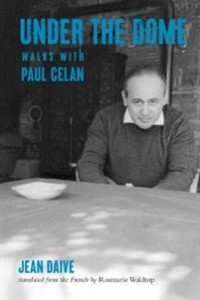Under The Dome: Walks With Paul Celan
An intimate portrait of Paul Celan in his last, increasingly dark years. Paul Celan and Jean Daive translate each other, walk, talk. Tensions, silences and, discreetly, Celan's crises and suicide. Autumn in Paris. Incessant walks under the dome of chestnut leaves. The Luxembourg Garden, the Square of the Contrescarpe. And, finally, the question: who are we, and how do we read the unreadable world?
Born in 1941, Jean Daive has since the 1960s composed an impressive investigative oeuvre that alternates between poetry, narration and reflective prose. He is also a photographer. He has worked on encyclopedias and as radio journalist, has edited three magaziness as well as translated Paul Celan and Robert Creeley. His first book, Decimale blanche (1967) was translated into German by Paul Celan, into English by Cid Corman. Other important titles are Fut bati (1973), Narration d'equilibre (1982-90: 9 volumes) and the prose series, La Condition d'infini (1995-97: 7 volumes, of which Under the Dome is volume 5).
––––
“I can't really think of a better introduction to Celan's poetry. And I can't think of a better introduction to the hauntedness of the man, the constant sense of loss that he endured…how this has left him permanently on-edge and raw-nerved in a world that too-constantly reminds him of the enormity of his losses. Literary criticism often approaches Celan's sufferings in terms of the debate with Adorno about whether there can be poetry after Auschwitz. Daive gives us a much less abstract, much more palpable sense of the damage that had been done to Celan. We don't get Celan as a chapter in the history of literary thought, here. Daive's gift to us is the presence of the man himself.” —Robert Archambeau, samizdat blog (Sept. 2009) http://samizdatblog.blogspot.com/2009/09/walks-with-paul-celan.html
“Under the Dome is Daive’s attempt to come to grips with the trauma of Celan’s 1970 suicide, which cut short a five-year friendship of walks and meals, conversations and explanations…. Daive’s explanation of his friend’s work—that “the verb is absorbed into the energy of the composite noun”—simultaneously justifies his own fragmentary method in Under the Dome, for it is through such unclassifiable fragments that we can best understand Celan’s life: “Paul Celan chews a word like stone. All day long. It produces word-energy. It all goes into the energy of his composite words. Here we have his biography”… The generosity and expansiveness [of this memoir] make Daive’s achievement worthy of the loss that underwrites it.—John Steen, Oxonian Review http://www.oxonianreview.org/wp/luminous-wounds/
“A record of a friendship; an impressionistic memoir recalling conversations (both profound and inconsequential) and encounters…from which emerges a composite portrait of Paul Celan…. He also made wonderfully gnomic pronouncements: “Use the colon. It syncopates.”… Iterative, fragmentary and suffused with an atmosphere of Paris in the late afternoon, the book precisely evokes the insistence of memory.” — Ian Pindar, TLS (March 12, 2010)
“a beautiful and haunting collage that mixes Daive’s lyric introspections with his recollections of a relationship that formed during Celan’s increasingly dark and erratic final years…. His meditative depictions of Celan’s suicide, Celan’s estrangement from his wife Gisele, and Daive’s own life after Celan’s death burn with a wounding yet imperative light, allowing us to at once see and see through.”— Robert Glick, Review of Contemporarty Fiction (Sping 2010)
Nøkkelord: Literary Nonfiction Memoir
- Forlag: City Lights Books
- Utgivelsesår: 2020
- Kategori: Prosa
- Oversetter: Rosmarie Waldrop
- Lagerstatus: Ikke på lagerVarsle meg når denne kommer på lager
- Antall sider: 200
- ISBN: 9780872868083
- Innbinding: Heftet


















